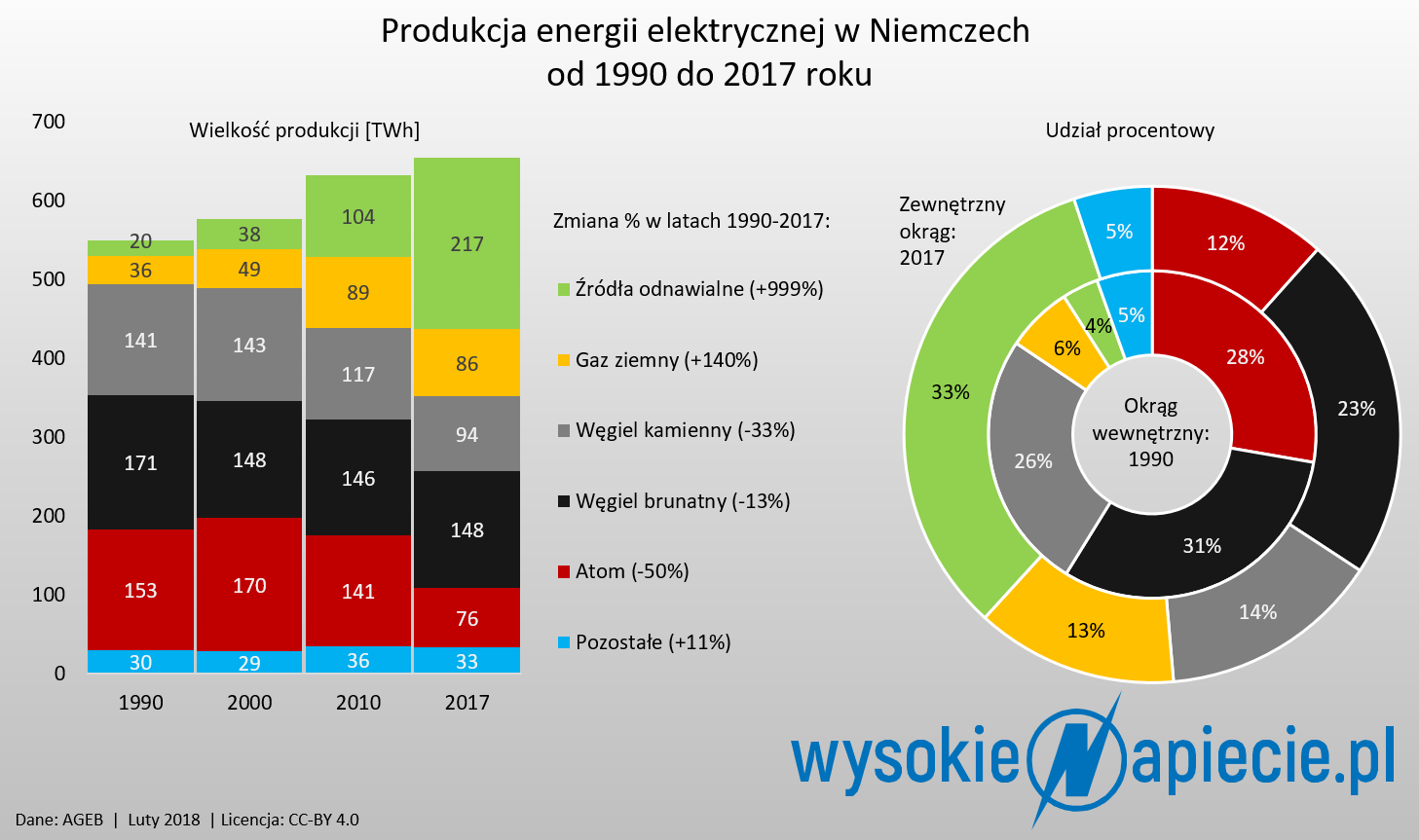By Bartłomiej Derski | Euractiv.com / WysokieNapiecie.pl | translated by Alexandra Brzozowski | – –
Since 1990, the production of “green” electricity in Germany has increased by 1,000% and export rates, according to preliminary data for 2017, just smashed another record. EURACTIV Poland’s partner WysokieNapiecie.pl reports.
When Germany was reunified, three electricity sources reigned supreme: brown coal held 31% of the energy mix, hard coal 26% and nuclear energy 28%. Renewable energy, mostly hydroelectric, only supplied Germany with 20 TWh, less than 4% of all electricity production.
Green vs coal and nuclear energy
After 27 years the situation looks completely different, especially after the last decade of rapid transformation.
Germany’s production of “green” electricity in 2017 amounted to almost 217 TWh, of which almost half (105 TWh) was supplied by wind farms, 46 TWh by biomass combustion, 40 TWh by solar panels and 7 TWh by biogas combustion.
Hydropower production remained unchanged, according to results from German organisation AGEB, which brings together German research institutes and industrial organisations.
The results mean that every third kilowatt-hour produced in Germany last year came from renewable energy sources.
By comparison, Poland’s electricity production last year was less than 166 TWh, of which nearly 80% came from hard and brown coal, about 6% from gas, and a dozen or so percent from renewable energy sources.
The figures were provided by PSE, Poland’s state-owned transmission system operator.
Between 1990 and 2017, the production of electricity in German nuclear power plants dropped by half (to 76 TWh); for hard coal it decreased by one third (to 94 TWh), and for brown coal by 13% (to 148 TWh).
On the other hand, electricity production in natural gas-fired power plants increased by 140% (up to 86 TWh), with the plants being able to react quickly to fluctuations in wind and solar energy generation.
Germany produces so much green energy that for most hours of the year the Bundesrepublik has the lowest wholesale price for electricity in Europe and is therefore a huge exporter of it.
According to preliminary data, AGEB sold 54 TWh of electricity abroad in 2017 – the biggest amount in history. Almost half of it was to Austria (including transmitting electricity through the Polish and Czech transit networks).
Some days, electricity prices actually go into the negative and nuclear power plants must reduce their energy generation by as much as half to prevent significant costs mounting up, this was the case on 28 January.
Merkel admits defeat
Although the production of green electricity displaces kilowatt-hours from coal and nuclear energy faster than the German government’s strategy assumed – and in 2017 more than one fifth of the “green” electricity produced in the whole EU came from Germany – Angela Merkel’s government had to admit a significant defeat.
In the draft coalition agreement, a rigid 40% definition of carbon dioxide emissions reduction by 2020 was abandoned. And this is not the result of coalition bargains, but simply the admission of the government that this goal is no longer realistic, so it does not make sense to enshrine it in the document.
According to last year’s government report (also unofficially disclosed), Germany will just about break through the 30% mark, compared with 1990 levels.
Determination of the German grand coalition will increase
This is by no means a cause for satisfaction for the Polish government, which for years has been torpedoing EU climate policy.
First of all, higher CO2 emissions by German industry, especially when it comes to energy, will mean higher demand and, consequently, the prices of greenhouse gas emission allowances in the EU ETS system will go up, which will result in higher electricity prices from Polish coal-fired power plants.
Secondly, the German coalition agreement sets out other goals: a 55% reduction of emissions by 2030 and as much as 80% by 2050, foreseeing a number of actions to make this happen. It will probably also mean even more determination of the new Merkel government to implement the decarbonisation policy at EU level.
A European Commission decision on Wednesday (7 February) to approve state aid for emergency power plants – often gas or coal-fired – has been accused of complicating ongoing negotiations in the European Parliament.
What Germany cares about in the coming years are primarily two sectors in which the share of renewable energy sources was stagnating for years: heating and transport.
The latter will be of particular importance. Although Germany uses 50% less energy for the transport of people and goods than for heating, the country is bound by its EU target of a 10% share of green energy in this sector by 2020. But for a decade the figure has stayed around the 6-7% mark.
After the Dieselgate scandal, the issue of old diesel cars, electro-mobility and an end date for the production of electricity from coal could take on even greater importance.
——–
Bonus video added by Informed Comment:
Germany breaks green energy records. EXPO 2017






 © 2026 All Rights Reserved
© 2026 All Rights Reserved